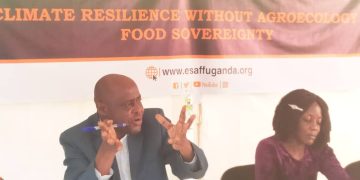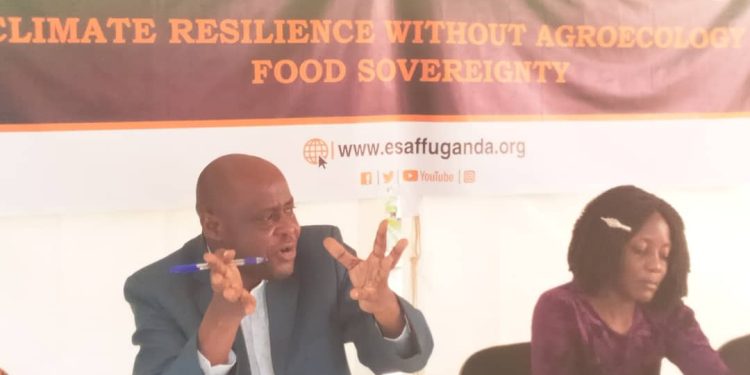Small scale farmers under the Eastern and South African Small Scale Farmers Forum (ESAFF) have called for inclusion in the ongoing global climate crisis negotiations given the impact that climate change makes on agriculture and the livelihood of small-scale farmers especially women in the rural areas.
Hakim Baliraine the ESAFF, Regional and National Chairperson, told reporters at a press conference held at their headquarters that the COP 26 agreements fall far short of ensuring a food system that feeds people in a way that is sensitive to different types of food, production conditions, and the relationship between this food and production processes which labor, the environment, and local and indigenous communities.
“According to our experience, the pests, vectors, diseases, floods, landslides, lightening, and prolonged droughts sparked by climate change across Uganda coupled with the pandemics bring to light the emergency of climate crisis facing the planet at the time of the 26th Conference of the Parties to the United Nations Framework Convention on Climate Change (UNFCCC), COP26,” he said.
Baliraine added, “ESAFF Uganda joins other indigenous communities, trade unions, feminist movements to air a loud and clear voice to the world leaders discussing our future, we want Climate Justice Now! ESAFF Uganda strongly believes that agroecology achieves climate justice with proven serious solutions to climate crisis, for climate mitigation and adaptation.”
Baliraine said that, Agroecology is key to small-scale farmers because it strengthens livelihoods and fosters collective actions to addressing the climate crisis and employs agricultural methods, such as diversification of crops, conservation tillage, green manures, natural fertilisers, biological pest control, rainwater harvesting, and production of crops and livestock in ways that store carbon and protects natural resources.
He noted that Agroecology is gaining traction as one innovative approach which meets the current needs without jeopardizing those of future generations to sustain themselves, while at the same time delivering healthy diets, biodiversity conservation, contributing to reducing the negative effects of climate change, and ensuring just and inclusive food systems that leave no one behind.
“In short, agroecology is well positioned to help countries meet multiple Sustainable Development Goals (SDGs),” he said.
Christine Nakijuna, a small-scale farmer from Mukono called for an awarding criteria and procedures of financial mechanisms such as the Green Climate Fund to small-scale farmers and their organizations so that farmer organisations can access available funding given their capacity to mobilizing small-scale farmers especially women and youths and building workable grassroot climate adaptation and mitigation measures.
“Parties should purposefully invest resources both technical and financial in research on agroecological approaches like resilient agricultural practices that are being nurtured by small-scale farmers, these approaches respect traditional knowledge and promote food sovereignty,” Nakijuna said.
The 26th UN Climate Change Conference of Parties (COP26) is hosted by the UK in partnership with Italy, taking place from October 31 to November 12, 2021 in the Scottish Event Campus (SEC) in Glasgow, UK.
The summit has brought parties together to accelerate action towards the goals of the Paris Agreement and the UN Framework Convention on Climate Change. Parties are reviewing the progress made in the fight against the climate crisis after the Paris Agreement signed in 2015, where nationally determined contribution targets were presented by parties for reducing emissions.
The summit is further set to focus on rapid reduction of global emissions, and climate finance among others. Countries will make new commitments in the fight against climate change amid rising calls for stronger action to limit the global temperature rise.











